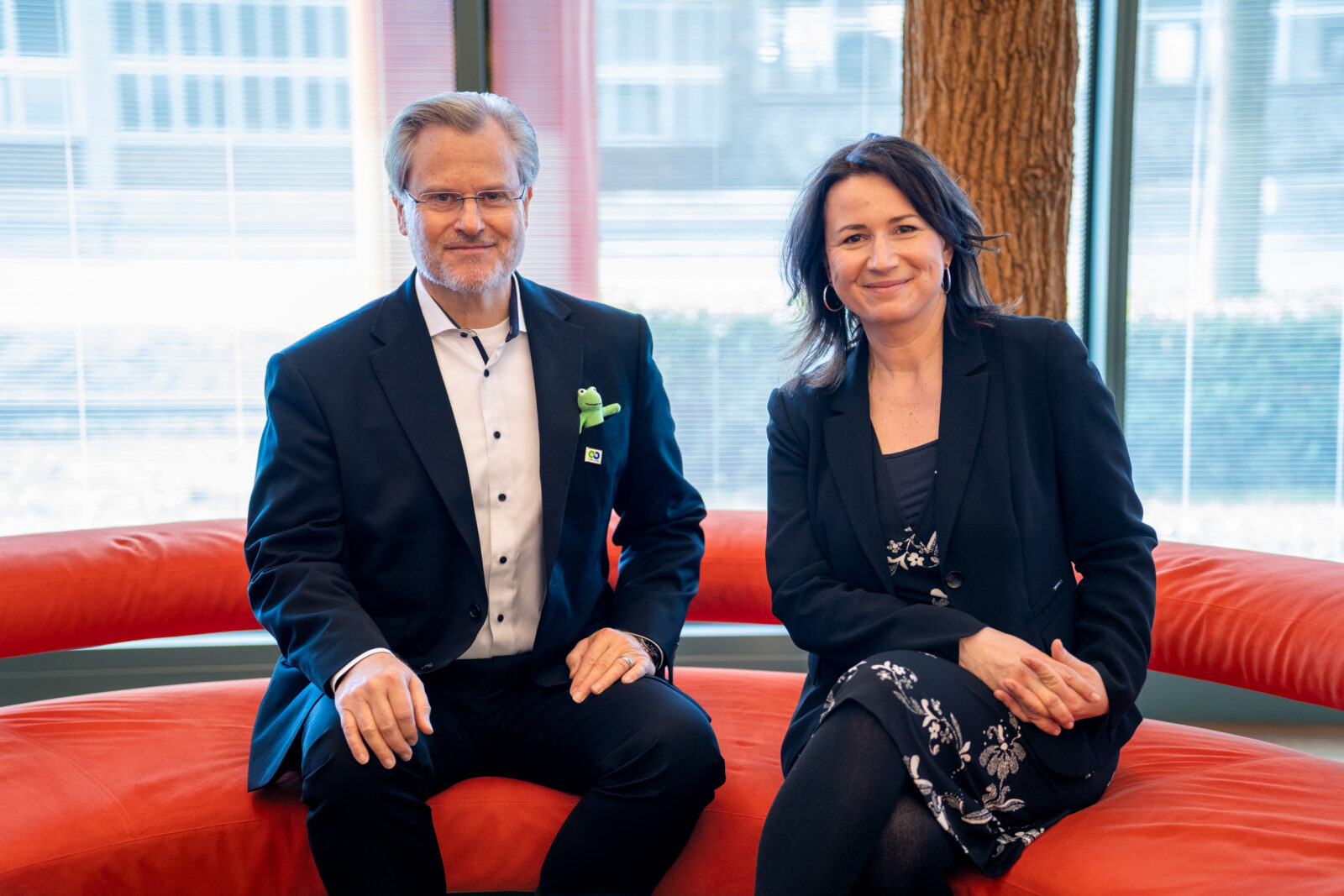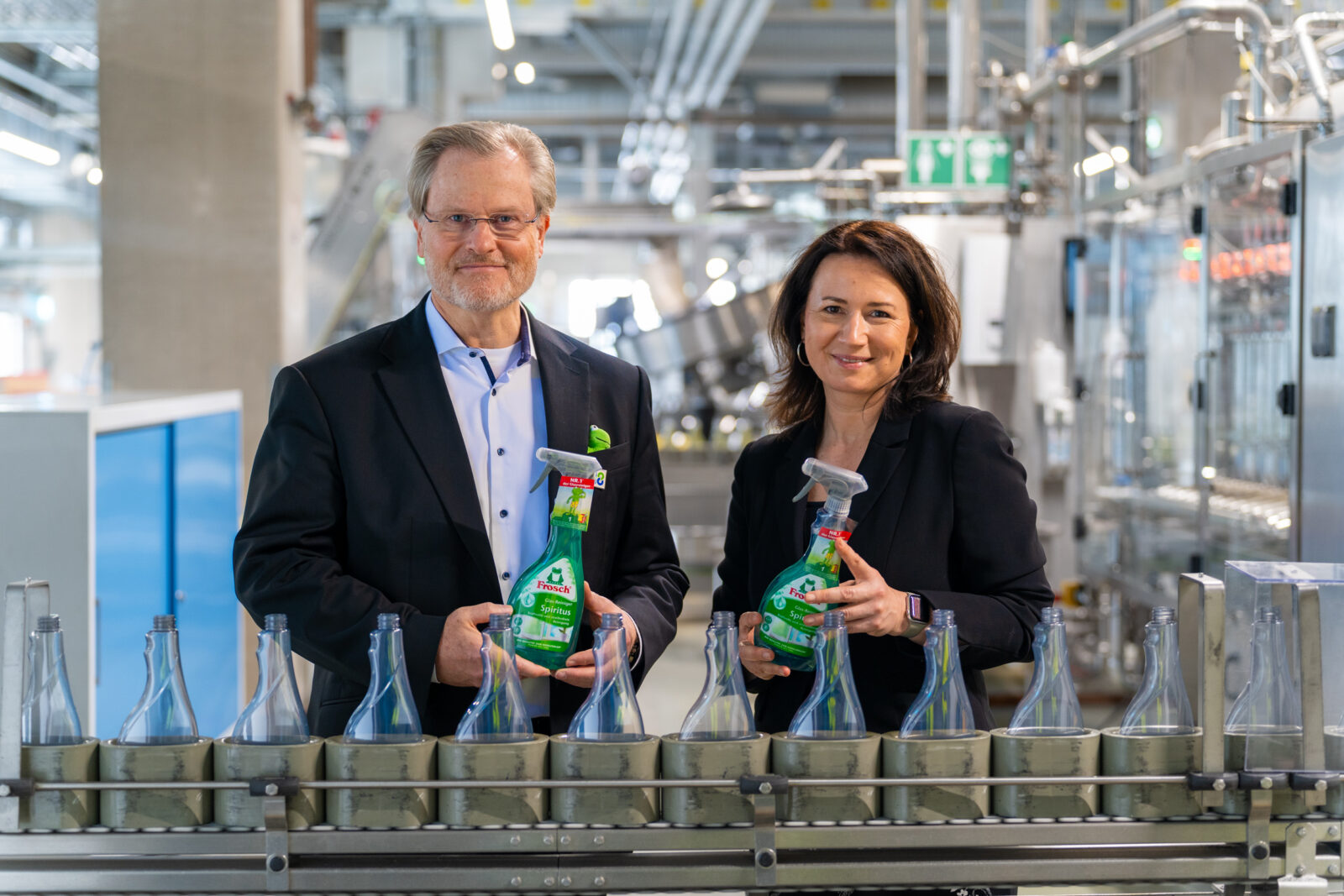Join the circular economy as it gains momentum
Werner & Mertz and BDE jointly call for a breakthrough in the Sustainability Transformation and concrete actions to strengthen the circular economy
During a visit to Werner & Mertz headquarters, Anja Siegesmund, who was elected executive president of the BDE (Bundesverbands der Deutschen Entsorgungs-, Wasser- und Kreislaufwirtschaft e. V.) in June 2024, and owner Reinhard Schneider demanded concrete measures to accelerate the circular economy in Germany and Europe. Beyond the development of modern recycling technologies, they targeted the protection of the domestic market and the fortificaton of the industrial site.
Geopolitics and Independence
Confronted by geopolitical challenges—such as developments in the USA—the EU is compelled to expand its latitude and increase its independence. “High-grade closed-loop circulation of plastic by means of mechanical recycling makes the EU less dependent on fossil fuels and strengthens our resilience,” said Schneider. This position underscores the potential of becoming a global leader in technological development.
“With the ramping up of a genuine circular economy, we not only make a great einvronmental contribution, but we also lay the cornerstone for an innovative and robust internal EU market. Companies like Werner & Mertz go to the forefront and demonstrate entrepreneurial courage with their investments. A clear political framework allows investment certainty and targeted funding and thus the competitiveness of our industrial site. The time is now,” said Siegesmund as the coalition negotiations for a new federal government were taking place in Berlin.

Progressive Circular Economy as Key to Climate Protection
Werner & Mertz has long shown with its pioneering work how the principles of the circular economy can be implemented successfully. The medium-sized company, which has led the way in the use of post-consumer recyclate, will set a new world record in June when its Recyclate Initiative reaches one billion bottles of 100 percent recycled material, most of which comes from household waste collections.
The transparent PET bottle production for the Frosch brand is now based on 75 percent of material from the Yellow Bag (supplemented by 25 percent from deposit bottle collection) and the HDPE bottles (High-Densitive Polyethylene) contain completely recycled material from the Yellow Bin and Yellow Bag. Closed-loop circulation turns plastic into a valuable raw material that contributes greatly to climate protection as it avoids significant CO₂ emissions.
The fact is that new plastic is still cheaper than high-quality recyclate from Europe. On top of that, (alleged) plastic recyclate is being imported from Asia at dumping prices. BDE and Werner & Mertz jointly demand a level playing field, the creation of a fair competitive environment with the same prerequisites for all market participants, so that effective climate protection is achievable.
Expanded Measures Catalog for Circular Economy
Together with bvse and VBS, and other players in the plastic and recycling industry, BDE is committed to a sustainable circular economy. In expanding the previous damands on the new federal government, Siegesmund and Schneider discussed the following measures and proposed more stimuli:
Monitoring and Certification of Imported Recyclate:
Recycling facilities in non-EU countries should be obliged to observe quality and environmental standards and provide proof of compliance with independent audits. Only recyclate of equal quality should be permitted to enter the European domestic market.
Cause-related Plastic Tax:
Instead of having consumers bear the costs of the plastic tax in the end, distributors should be responsible for taxes on climate-damaging new plastic—while Post-Consumer Recyclate remains tax-free. This measure creates a financial incentive to greater investment in recycling technologies.
Slashing of Subsidies for Fossil Raw Materials:
The legal favoritism for new plastic—through EEC tax exemption, for example—should be terminated. Instead, subsidies should be redirected to support innovations in the recycling sector.
Innovation Financing and Investments in Recycling Technologies:
It has been suggested that a fund be set up to which all companies that use new plastic would contribute. The funds should flow into research, development and the expansion of modern high-grade recycling processes. At the same time, legally mandated minimum rates for the use of recyclate should be imposed.
Protection of the Internal Market and Fortification of the Industrial Site:
Our reference to the recently published technical information (KUNSTSTOFFE FÜR KREISLAUFWIRTSCHAFT UND KLIMASCHUTZ) draws attention to the protection of the EU domestic market. Topics included are: securing fair competitive conditions, support of regional value chains and improvement in waste management infrastructure.

Other Demands on the New Federal Government:
After discussions with Schneider, BDE sees that the new federal government should take the following additional steps:
Funding of Recycling Research:
Establishment of a funding program that specifically supports innovative mechanical recycling technologies and the conversion of waste into high-grade products.
Optimization of Waste Management Infrastructure:
Investments in modern collection and sorting systems to make the collection of post-consumer waste more efficient.
Creation of a Binding Legal Framework:
Implementation of a legally mandated minimum rate for the share of recycled material in new goods linked with incentives for its overfulfillment to 100 percent, and binding quality standards for imported recyclate.
Promotion of European Recycling Systems:
Support of European initiatives aimed at closing the material cycles in order to minimize depedence on fossil raw materials and their countries of origin.
Green Public Procurement as Strategic Lever:
Public sector support of the circular economy by including recyclate and recyclability in bidding criteria. The increased use of recycled raw materials within the scope of Green Public Procurement gives a country or region better control of its resources, makes production locations without their own primary raw materials less dependent on imports, and reinforces their resilience in the long term.
Shared Dialog and Outlook
The measures presented should serve as the basis for intense dialog with representatives from politics, business, science and society. Werner & Mertz and BDE confirm their intention to be actively involved in the implementation of legal conditions—such as the national circular economy strategy, the EU packaging regulation PPWR, the Clean Industrial Deal and the planned Circular Economy Act—and, as needed, to demand modifications.



